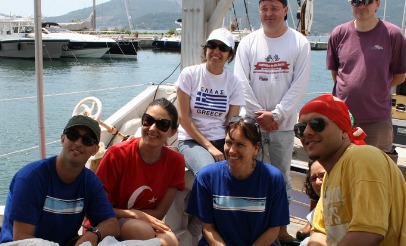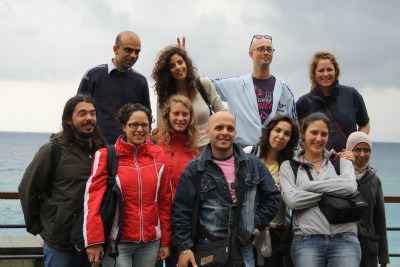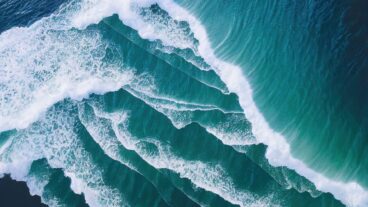Looking to save the Mediterranean, a multinational student group seeks a holistic regional approach to improving the marine environment.

If you look at the issues facing the Mediterranean Sea, the situation seems bleak: Polluting plastics are choking sea turtles and the “lungs” of the sea, over-fishing and bottom trawling is depleting fish stocks, and invasive species like jellyfish are wreaking havoc on this most famous marine playground.
But when you grow up with the sea in your backyard, as is the case for Israelis, Lebanese and Palestinians, this is a natural backdrop for a new kind of peace project.
Going against the tide of politics rocking the Middle East, a group of 12 young marine scientists, most of them doctoral students from Israel, Lebanon, the Palestinian Authority, Turkey, Tunisia, Malta, Greece, the UK and Italy, went to Italy in June to combine minds and passions for solutions to the Mediterranean Sea’s biggest human-made problems.
The joint research project was initiated by the Israeli marine educational project EcoOcean and was supported by the Italian government. EcoOcean sent its ship, the Mediterranean Explorer, to Italy for the two-week workshop.
A waterborne exercise in coexistence
Daniel Schaeffer, EcoOcean’s director, tells ISRAEL21c the experience has been “mind blowing.”
“There were evenings when the dinner-table conversations just blew me away. There were conversations on what is happening in the Middle East; on women’s rights, for instance. Two-thirds of the participants were women. So feminist issues came up, and people were talking about their countries, their cultures, their dreams — and of course these are very intelligent young people.
“The conversations were led by logic, not by gut emotions, and to me it’s mind-boggling to see a Lebanese, a Tunisian, an Israeli, and a Turkish girl sitting together talking about women’s rights in the Arab world. Or the fact that an Israeli asks a Palestinian to show his passport and is excited to see it. We couldn’t have asked for a better bunch of people.”

For an Israeli like Schaeffer, it’s not common at all to see young graduate students from such backgrounds working together. And it’s not just the Israelis and the Palestinians. Almost everyone in the region has a problem with their neighbors, he says. Because of that, there is a very distinctive problem with environmental preservation in the Middle East.
No man is an island
Despite an obvious concern for the environment, each country has its own policies, programs and ideas on what should be done. There is no real comprehensive plan of action.
“This is the theme behind this workshop: There has to be a holistic regional outlook towards environmental issues,” says Schaeffer. “The fact that each country in the Mediterranean has two neighbors that most likely don’t like them — the Greeks and the Turks have conflict, [people in the] Adriatic Sea have conflict — if we want to build something for marine protection, there needs to be more regional cooperation.”
Some key problems are over-usage of natural resources, consumerism, plastics, commercial fishing — basically “everything we do,” Schaeffer says.
Operating since 2002, EcoOcean runs educational programs in Israel to teach young people the importance of marine conservation. Its boat is lent at cost to academics interested in marine research. The organization’s programming has reached thousands of students and its research has influenced policy-makers.
To this end, the organization has been instrumental in conducting and supporting baseline research in the Mediterranean Sea so that governments can benchmark goals for the future. There is no sense in setting legislation or limits on pollution if no one knows what’s really happening out at sea. That’s the reasoning of EcoOcean’s founder, Andreas Weil, originally from Sweden.
On land and on sea
The two-week June workshop held near La Spezia, Italy, was called “Environmental Impacts Know No Boundaries” and was run in cooperation with the Italian organization Environmental Ocean Team.
During the first week of the course, students took part in interactive lectures, demonstrations and field trips. In the second week, two different oceanographic research projects were carried out at sea on the Mediterranean Explorer and on the Italian S/Y Adriatica.
Schaeffer explains that the Adriatica crew was researching whale movement and acoustics monitoring, while the Explorer crew worked on building up-to-date profiles for data research centers.
It might seem like a small step, but it is an historic one.
“Environmental issues many times transcend national borders and political restrictions,” Schaeffer says. “To develop and protect marine and coastal ecosystems, such as within and around the Mediterranean Sea, we must promote cooperation in marine research and management between nations.”












